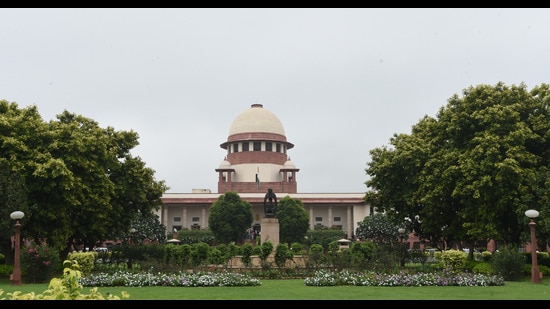Aug 07, 2024 06:09 AM IST
According to justice Sehrawat, the SC thinks of itself as more “Supreme” than it really is, and it thinks of HCs as less “high” than they truly are
The Supreme Court on Tuesday took suo motu cognisance of an unusual order issued by a Punjab and Haryana high court judge, who criticised a stay order previously passed by the apex court while commenting that the Supreme Court tends to perceive itself as more “supreme” than it actually is and views high courts as being less “high” than they are constitutionally.

A five-judge bench, consisting of Chief Justice of India Dhananjaya Y Chandrachud and justices Sanjiv Khanna, BR Gavai, Surya Kant and Hrishikesh Roy, will hear the matter on Wednesday. The bench comprises the first five judges of the top court.
The case, titled “In Re: Order of Punjab and Haryana High Court Dated 17.07.2024 and Ancillary Issues,” was registered following the high court order on July 17. In that order, a single bench led by justice Rajbir Sehrawat made several critical remarks about the Supreme Court’s decision to stay contempt proceedings initiated by the high court in a case.
According to justice Sehrawat, the Supreme Court thinks of itself as more “Supreme” than it really is, and it thinks of the high courts as less “high” than they truly are in terms of the Constitution. His judgment also sounded a “note of caution” for the Supreme Court, asking it to be more explicit about the potential legal ramifications of any decisions it makes.
Justice Sehrawat noted that the Supreme Court stayed the contempt proceedings not while hearing an appeal against the order initiating contempt, but in an appeal against the order that led to the contempt proceedings.
He observed: “Seen at a psychological plane this type of order is actuated, primarily, by two factors, firstly a tendency to avoid owning responsibility of the consequence which such an order, in all likelihood, is bound to produce, under a pretense that an order of stay of contempt proceedings does not adversely affect anybody. Secondly, a tendency to presume the Supreme Court to be more ‘Supreme’ than it actually is and to presume a High Court to be lesser ‘High’ than it constitutionally.”
The judge also emphasised that the apex court itself has clarified numerous times that high courts are not subordinate to the Supreme Court. “The relation between high court and the Supreme Court is not the same as is the elation between a civil judge (junior division) within its jurisdiction and the high court. In terms of Articles 132 to 134 of the Constitution of India, the Supreme Court is not even an ordinary court of unconditional appeal, unless there is a specific statute providing for appeal from the orders of the high court to the Supreme Court in specified matters,” said justice Sehrawat. Therefore, the judge asserted, “there is no scope for sundry direction being issued by the Supreme Court to a high court, regarding certain proceeding pending before a high court.”
The judge acknowledged that while high courts may follow directions from the Supreme Court, whether out of perceived coercion, due regard, or institutional majesty, the Supreme Court may not always consider the “drastic and damaging consequences” its stay orders on contempt proceedings can produce.
As an example, the high court referred to a stay order in a specific case, which the jduge claimed, deprived about 35% of Punjab and Haryana superior judiciary members of their selection grade and super time scale for several years. This happened because the high court, on its administrative side, interpreted the Supreme Court’s stay as a de facto order staying a final order passed by its division bench on the judicial side, justice Sehrawat said.
The judge questioned who should be held responsible for this situation — “the high court or the Supreme Court?” He suggested that both courts engage in “soul searching” to address this issue and advised that the Supreme Court should be more specific in its orders to avoid similar situations in the future.
His judgment concluded by adjourning the case sine die until the Supreme Court decides the relevant appeal, while noting that such a course might not always be possible for a high court to follow, depending on the facts of a particular case or the involvement of specific statutory provisions.
It is also noteworthy that on Monday evening, high court chief justice Sheel Nagu modified the roster, transferring all contempt of court cases from justice Sehrawat to justice Harkesh Manuja.
The Hindustan Times YouTube channel now has 7 million subscribers. We thank our viewers for their support. Follow the channel for exclusive video news on politics, sports, entertainment & more. Click here.
See more


